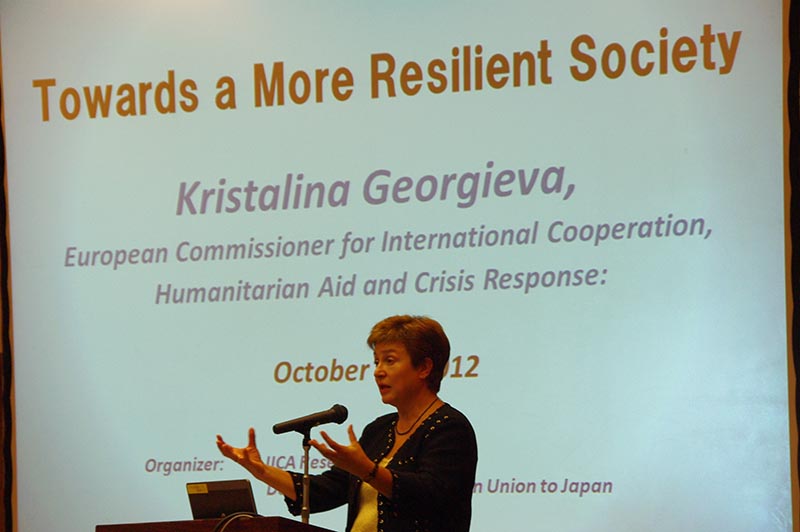Towards a More Resilient Society through Enhancement of Disaster Prevention and Countermeasures
2012.10.15
The JICA Research Institute and the Delegation of the European Union (EU) to Japan held a joint seminar titled “Towards a More Resilient* Society” on October 11.
The Institute invited Dr. Kristalina Georgieva, European Commissioner for International Cooperation, Humanitarian Aid and Crisis Response as a guest speaker. Last year she came to Japan right after the Great East Japan Earthquake, having engaged in consultation with Japanese authorities and aid providers over relief operations, and in the arrangement of logistics of European assistance being delivered to disaster victims.

At this seminar, Dr. Georgieva gave a presentation on how Japan and EU could play a role in contribution to fostering resilience in developing countries with sharing the experience of the Great East Japan Earthquake, as well as exchanging views on this subject with seminar participants.
Referring to the building of a more resilient society through the enhancement of prevention and preparation for disasters, she mentioned: “Investing in resilience is a moral imperative but also a finance imperative. The number of natural disasters worldwide has recently been on the rise. While the number of disasters in developing countries accounts for around nine percent in the world, victims there makes up almost half of the total number worldwide. Since the benefit in terms of reducing damage cost is estimated 4-7 times higher, such investment should be promoted.”
She also emphasized the importance of disaster risk management being incorporated into the integral part of genuine sustainable development in disaster-prone countries, along with expecting JICA to make use of its abundant experience in the field of disaster risk management.
During the question-and-answer session, a number of questions were raised: the guidelines for an approach to create trust with local parties concerned, important factors in humanitarian aid, and the EU’s commitment to boosting resilience in the Asian region as well as the outlook for implementation of a relevant approach.
Dr. Georgieva responded first with the definition of resilience—capacity to cope with shocks—which requires investment in three ways: physical, human and institutional capacities. She also explained that humanitarian aid community including EU has three action principles, “Impartial,” “Neutral,” and “Independence” to create trust. Referring to Asia, where many countries are also vulnerable to natural disasters, she stated that EU can learn from Asia through cooperation and sharing experiences, since they are much more self-reliant than Africa.
Kristalina Georgieva
Commissioner, International Cooperation, Humanitarian Aid and Crisis Response, The European Union

事業事前評価表(地球規模課題対応国際科学技術協力(SATREPS)).国際協力機構 地球環境部 . 防災第一チーム. 1.案件名.国 名: フィリピン共和国.

事業事前評価表(地球規模課題対応国際科学技術協力(SATREPS)).国際協力機構 地球環境部 . 防災第一チーム. 1.案件名.国 名: フィリピン共和国.

事業事前評価表(地球規模課題対応国際科学技術協力(SATREPS)).国際協力機構 地球環境部 . 防災第一チーム. 1.案件名.国 名: フィリピン共和国.

事業事前評価表(地球規模課題対応国際科学技術協力(SATREPS)).国際協力機構 地球環境部 . 防災第一チーム. 1.案件名.国 名: フィリピン共和国.

事業事前評価表(地球規模課題対応国際科学技術協力(SATREPS)).国際協力機構 地球環境部 . 防災第一チーム. 1.案件名.国 名: フィリピン共和国.
scroll